DEEP DIVE
Poacher — by whose definition? Aboriginal fishing practices sunk by big industry, ‘colonial’ regulations
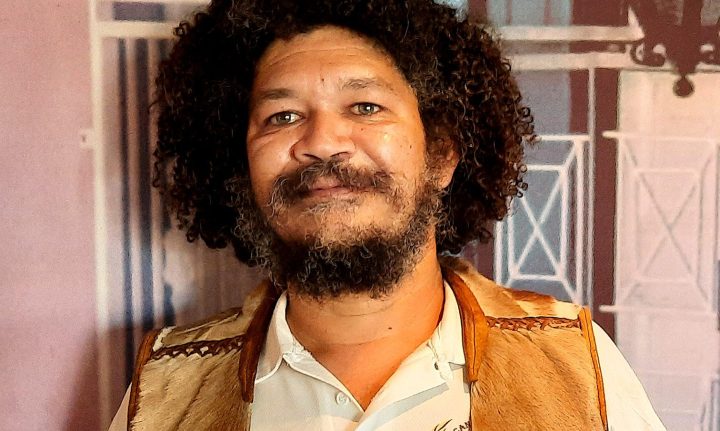
Sores Florus has been arrested and jailed 14 times for doing what his ancestors have been doing for thousands of years.
Sores has presence, both in terms of his tall, strong diver’s body, halo of dark hair, springbok-skin waistcoat and warm affability. He’s also forceful when he needs to be and highly articulate, making him a formidable activist for Aboriginal fishing rights and a target for authorities when he challenges them, which is often.
We’re standing at a wide hotel window overlooking Table Bay where a Human Rights Commission hearing into fishing rights has just ended. A stern trawler is heading for the breakwater between massive container ships anchored in the bay.
Sores looks at it reflectively for a moment and says: “They call me a poacher. Those boats are ripping up the ocean and I get arrested for two abalone. It doesn’t make sense.” His fight, however, is not about two abalones but about the ancient right of his people, the Hessequa, to gather food along the seashore.
“You have to understand the context,” he tells me. “For thousands of years, my people fed their families by honest means along the shores from present-day Namibia to KwaZulu-Natal — the middens and rock art are there as evidence. Then we were colonised by immigrants and migrants who made laws for themselves with unconditional voting systems in the form of politics to their own advantage. Everyone knows the history of this country.”
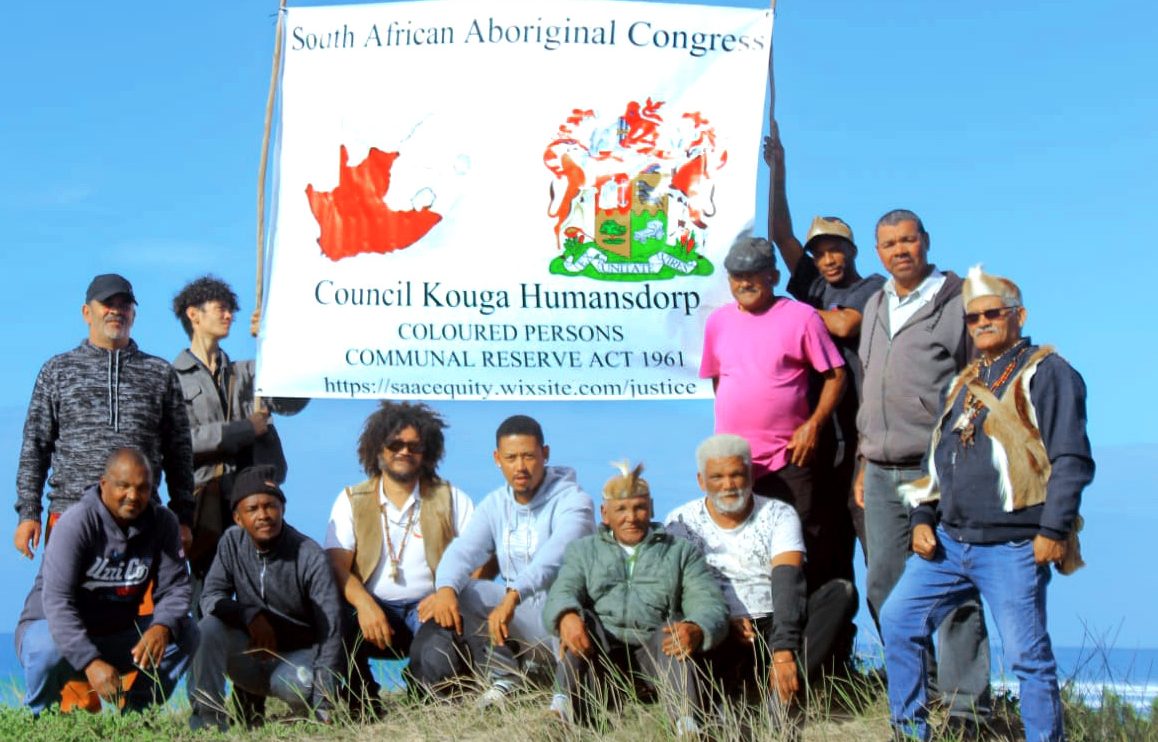
Jeffreys Bay and Humansdorp Aboriginal fishermen at their weekly gathering. (Photo: Supplied Sores Flores)
Don Pinnock: Can you verify your Aboriginal rights?
Sores Florus: I absolutely can. I come from Genadendal which is the first Aboriginal land where the Moravians founded a missionary station on Hessequa territory. The Moravian Church decimated a lot of our culture, but also preserved a lot because they kept records from the very beginning. The people they took in were Hessequa, who are Hottentot people, the original citizens of southern Africa.
Bot Rivier, Hemel en Aarde, Hermanus, McGregor through to Riversdale, it’s all Hessequa territory amongst other tribes. That’s documented by the missionaries as well as our own people when they learned to read and write.
When I was still at school, I helped with the museum in Genadendal and got to understand my origins. I know who I am. We have always collected wild plants for food and medicine, wood for fires and fished as part of our livelihood.
DP: So that gives you fishing rights beyond licences and quotas?
SF: Yes, because as Aboriginal Hottentots we understand our rights to food. During my childhood, there were no licences for fishing, no trespassing laws for firewood collection and interdicts prohibiting us from moving onto our own land. The legal system prohibited fishing for our people, then introduced a permit and licence system.
The licences were complex and costly, essentially ringfencing them for big-money immigrants and migrants. Permits for our people were based on racially based policies as we are not Black African or Afrikaner in particular as defined.
I got five-year ‘rights’ renewed four times over the past 20 years on a 500kg abalone quota. Our grandfathers in the past had two tonnes or more during the ‘70s to ‘90s and there were no quotas before their time. The insatiable export markets were not yet there.
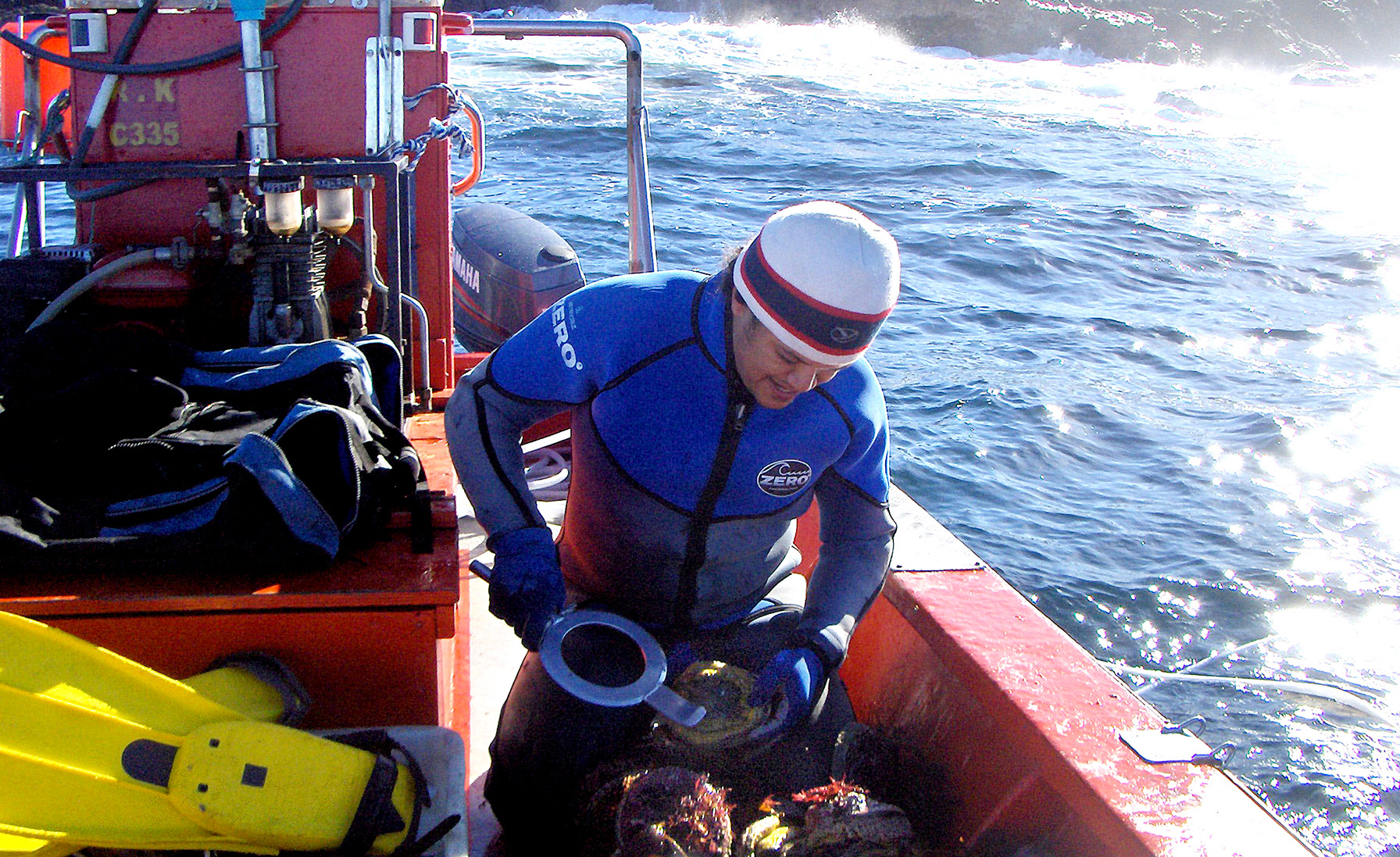
Sores Flores harvesting his permitted abalone quota. (Photo: Supplied by Sores Flores)
And there was a catch. Under the new fishing rules you needed state-vetted experience, a commercial diver’s licence, a boat with a compressor and an agreement signed by a local processing plant. We didn’t have all those assets and infrastructure. You also had to sell your entire catch to the processing plant, mostly for export. Not a single abalone, crayfish or fish can be taken home for consumption by ourselves or our families.
Read more in Daily Maverick: Small-scale fishers struggle to survive while facing a litany of regulations
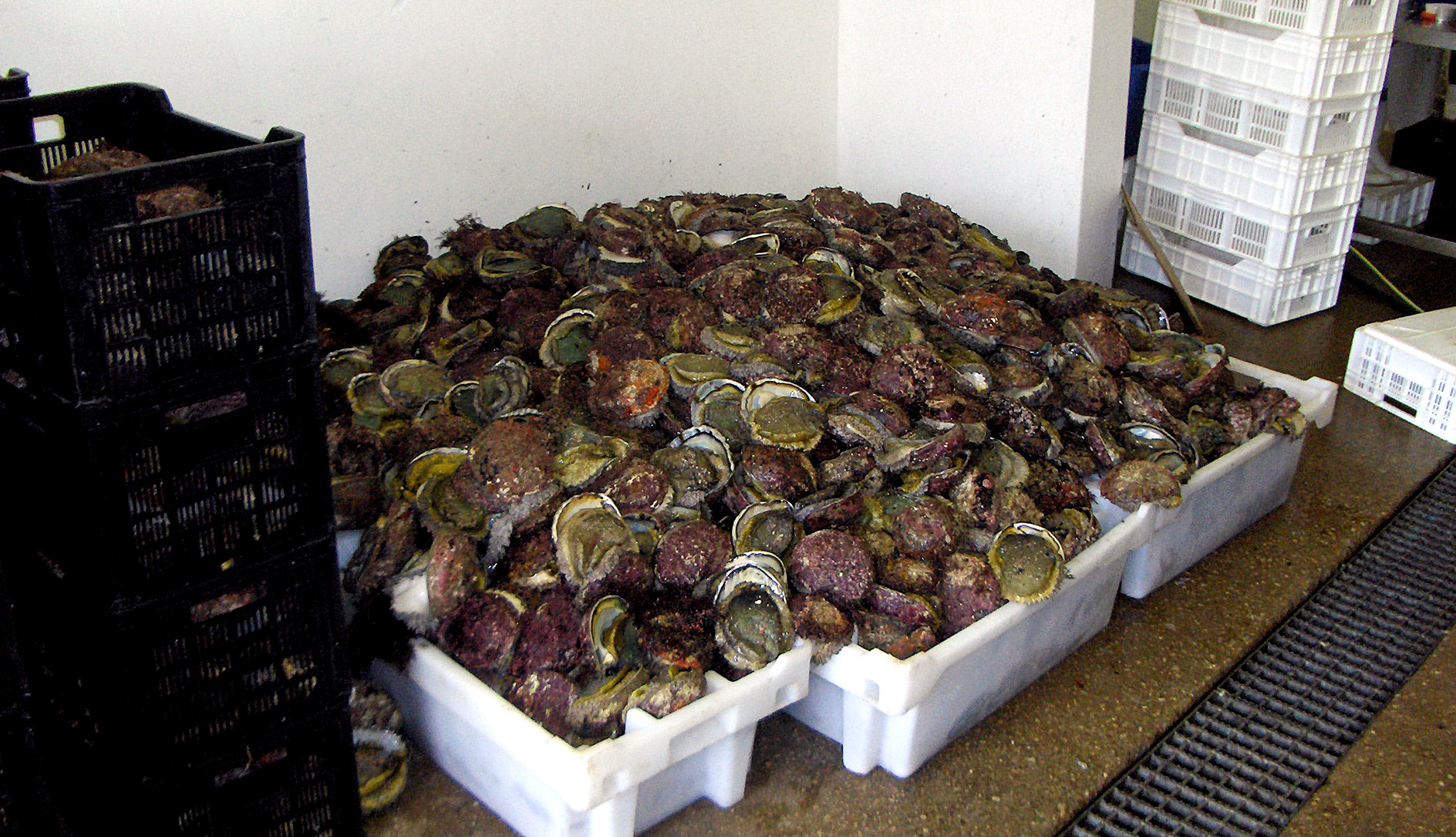
Harvested abalone. (Photo: Supplied by Sores Flores)
DP: Who owned the processing plants?
SF: That’s the right question. They were and are owned by people who had the capital to set them up. They bought boats that comply with state specifications and rent them to locals with fishing quotas at R55,000 a season.
On top of that, you have to pay R16,000 a year levy to the government and maybe you have to take out a R10,000 loan — which they misrepresent by calling it an advance.
These actions are technically prohibited because the interest over the loan period is way higher than the legal interest rate. But quota holders are forced to take these high interest rate loans to survive the season.
Because you’re not allowed to harvest for food, you now have to use their ‘advance’ to buy the fish that was caught off your local beach by yourself. This fish is also now in a tin with a multinational company label on.
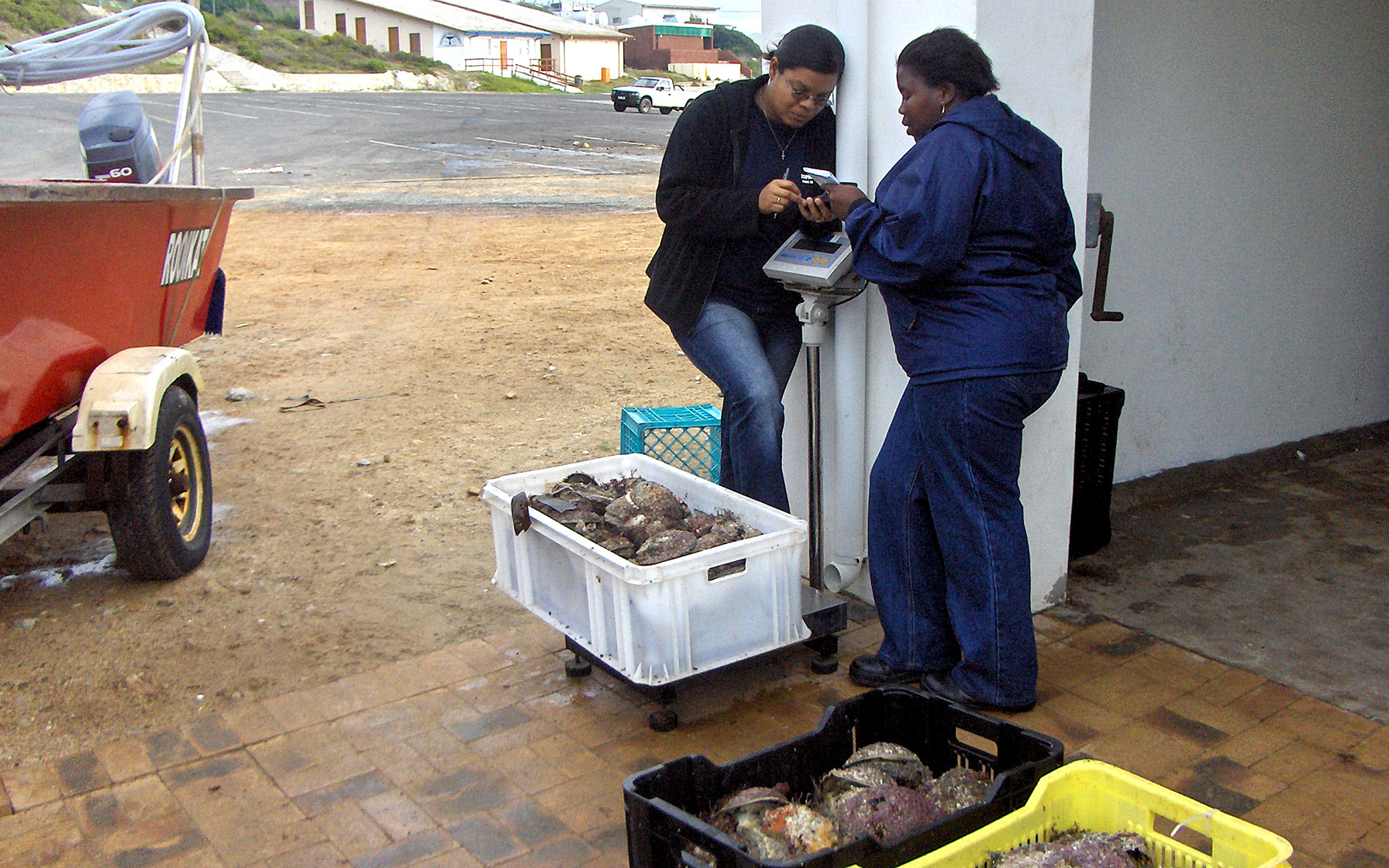
Department of Sea Fisheries and processing plant employees making sure all the abalone are weighed and counted. The whole catch must go to the processing plant. (Photo: Supplied Sores Flores)
I have an invoice where I paid R1,600 a kilogram for my own quota of abalone from the same processing factory that paid me R450 a kilogram that very same year. The plant pays you for your catch on a sliding scale dependent on the size of your advance. With a R10,000 advance you get R650 a kilo for abalone, for double that advance you get R500 a kilo. And so it goes, less and less.
On top of that, the Department of Fisheries started cutting our quotas. I went down from 500kg to 150kg then 130kg. Do the sums. A lot of fishers are earning R6,000 a year and the processing plant R250,000 on the very same quota.
DP: You told me earlier that non-local people were also getting quotas.
SF: They are. We’re up against BEE guys — voting fodder — who know nothing about fishing, maybe live in Soweto, Crossroads or Khayelitsha and get quotas as traditional fishers which they almost exclusively sell to the processing plants, totally excluding the local inhabitants.
It gets worse. The processing plants also get state quotas — up to, but not limited to 120 tonnes for abalone and crayfish. There’s one foreign national fishing company who received the right to fish 100,000 tonnes in our waters… BBBEE compliant. Without our consent.
DP: I guess my next question has to be about poaching.
SF: Of course! It’s inevitable. But can you call it poaching? It’s a label stuck on people, many of whom are exercising their Hottentot rights. Even with quotas, people struggle to survive. But many are disallowed licences.
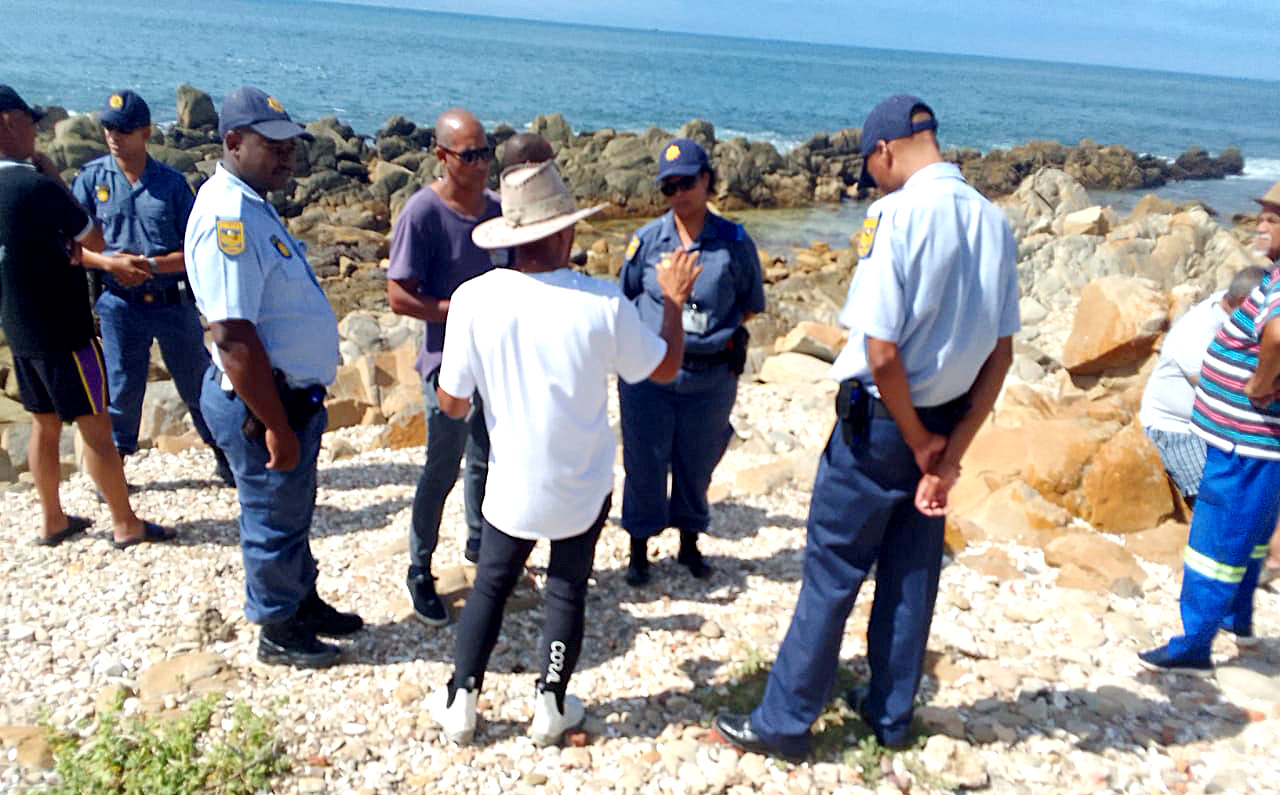
Police confronting Aboriginal subsistence fishermen in Mossel Bay, Cape Town. (Photo: supplied Sores Flores)
DP: Why is that?
SF: A few reasons. First we are not declared Africans. In terms of legal definition, we disappear as a people, no longer Hessequa. When we are arrested for harvesting our food in terms of our culture, be it fish or game. It’s defined as poaching and criminalised.
Then, if you are arrested, it makes you ineligible for a permit or licence. From West Coast, Hawston to Ggeberha and East London, I estimate that excludes about 70% of the fishing community. That stands until you can get your record expunged and that takes up to 10 years.
So now what do the inhabitants do? They don’t want to act illegally but the system has excluded and evicted them from their own land and food resources. They’re the guys who do the work, not the middlemen or transporters, and they’re the guys who go to jail. And they can’t work with the processing plants so they have to plug into the organised crime networks who screw them exactly the same, but without a government rubber stamp of approval.
DP: Have you been arrested?
SF: Yes, arrested and jailed 14 times, once in Pollsmoor Prison. Right now I’m out on bail pending yet another constitutional and human rights violation matter. They want to put me on trial for contravening the Marine Living Resources Act. My bail conditions are that I’m not allowed to talk to individuals, groups or organizations.
DP: Or me?
SF: Probably not. To be here today I had to get permission from my investigating officer to leave my municipal area. By 10am tomorrow I have to be in Jeffrey’s Bay to sign in. I’m not allowed to be on any beach or have any fishing equipment. It’s very stressful for my family every time I leave the house.
DP: You must spend a lot of time in court.
SF: I do, and every time it costs me money to hire legal assistance and travel to court hearings. But you can’t reason with a policeman who has just beaten you to a pulp, confiscated all your equipment and is now dragging you through the criminal courts for feeding your family, collecting firewood or harvesting medicinal plants. All our food, fuel and medicine are now deemed private property.
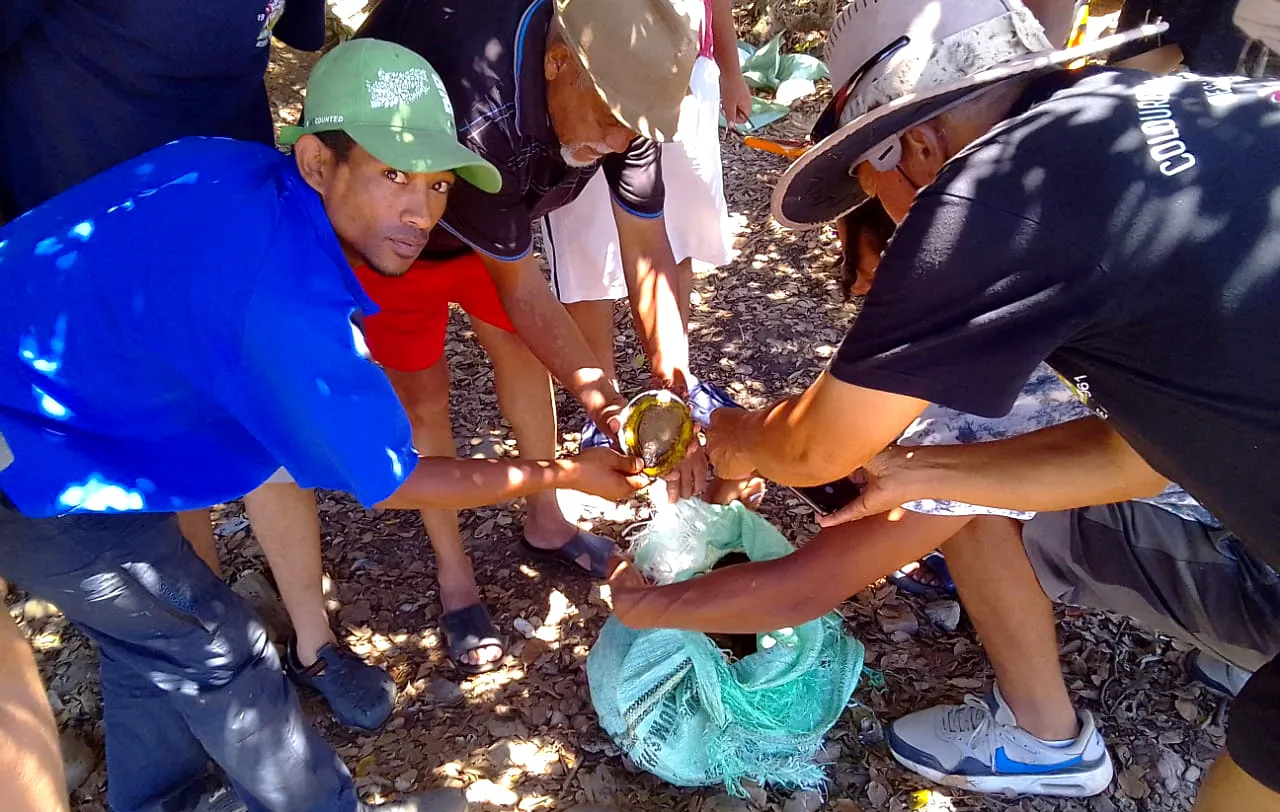
From left: Gavin Fransies, Roelf Deli and Alestain Visagie with their food harvest in Mossel Bay. (Photo: Supplied by Sores Flores)
Read more in Daily Maverick: Abalone and rock lobster stocks are under severe threat — here’s how to preserve them
DP: So you’re saying there’s a deep injustice here.
SF: There certainly is. Our people are branded poachers and what do you imagine a poacher looks like? You don’t picture black or white guys as poachers. Poachers are Coloured people in Hawston or Hout Bay, right? That is now the definition of a poacher. Gangsters.
They’re guys who have to go out at night, crawl around in the bush like thieves, some of them on their bellies. It’s a white beach and they may crawl 500 metres. Some have been eaten by sharks. That’s the desperation level, what it entails to be a Coloured fisherman. And this has become the norm and it has become cool because some of the guys have been flashing stacks of money.
It’s not sustainable. It’s not regular. But it comes with the industry. You have to give up your honest right. You have to accept that what you’re doing is now an illegal act that you’re a part of. And to accept that willingly is one of the hardest things to do.
So I hate the fact that our people are branded poachers when they try to earn an honest living out of the sea. I hate the fact that they say a small amount of abalone constitutes poaching, when one commercial boatload of permitted abalone would probably make up a month’s diving of a whole community the traditional way. Who are the poachers here?
When we talk about poachers and illegal poaching, I want to continuously reiterate, we’re talking about Aboriginal divers who are desperate, who are branded poachers and criminalised because the system is doing exactly what it’s intended to do — to criminalise the real owners and to legalise illegal guys. Nobody looks at the big commercial boats ripping up the ocean.
The factories are set up as a one-stop shop and have a central market with a value chain for international buyers. The people benefiting from this continent and its resources are comfortable, but not the true owners of the resource. We from whom it was stolen by foreign invaders are simply used to mine it. They get rich and we get arrested.
Sores is packing his bag and his transport is waiting. I ask him what will happen if he doesn’t report in by 10am tomorrow.
SF: Probably get arrested…again. DM
Sign up for The Battle for the Right to Fish webinar



















 Become an Insider
Become an Insider
The shallow reefs for a hundred kilometers along the Overberg have now been stripped bare of abelone. The conflict in places like Bettiesbaai, where gun-toting poachers in their pick-up trucks threaten concerned residents, is well documented. Even along densely populated strips like Blouberg people see BMW’s pull-up to drop-off 4 or 5 guys in scuba gear to continue the plunder, or boats launching from Houtbay to poach in the marine-protected TMNP. I’m supportive of a massive cut in commercial licenses in favor of local communities that can harvest sustainably. But also cut the crap: nobody’s ancestors had scuba kits and the ability to rip out 200 perlemoen in a dive. And we see the millions the king-pins make and are not buying the “just trying to survive” angle on organized crime and syndicates.
It is difficult to know where the cut lies… are they now fishing less sustainably because it is illegal, or are they made illegal because they fished unsustainably. At R650/kg, it is understandable that there will be a huge drive. Not for home eating…
I think the distinction should be made between local communities who at least try to fish/harvest sustainably and organised crime syndicates who rape and plunder the resources into oblivion. The unsustainable impact of big industry should be noted but then they employ people and pay taxes; the stuff that governments love. The world has also fundamentally changed from when small communities of people populated these shores 400-odd years ago compared to the tens-of-millions today. The plight and rights of indigenous communities cannot be ignored but the impact of the poaching seems to be down-played here. Who’s advocating for nature’s rights?
Can’t disagree with you, i just think that the big players are making it impossible for the little ones yo stay legal. What happens when you make something illegal. No quotas for processing plants and small personal professional quotas?
Just read Paul Weinberg’s ‘Once We Were Hunters’ to confirm the validity of Flores’s argument. It’s the story all over the African continent – the world in fact. In this case the ridiculous quota system only favours the big companies or the politically connected. And the indigenous/aboriginal fishers are such an easy and safe target for the police. Justice is always an elusive concept, and it is completely absent here. And yes, I do believe in conservation of our marine and other natural resources, I actually work a lot with Marine Protected Areas, but the way our and other governments go about conservation, without engaging the people who really understand – the indigenous, traditional hunters and gatherers – is nonsense. Like pushing the Maasai off the land in Loliondo Tanzania, so that big private (Arab) money can set up a shooting reserve. Simply madness. I feel for Flores and his people
Totally agree.
Disagree. The world (population) has moved on from the days when substance hunting and gathering was sustainable. Too many people. (What about Flores’s siblings and cousins, and all their kids – how small should the pie be to still make it “sustainable”?)
And call me cynical but not for one second should one believe that Flores – or whomever corner the market for themselves – will exercise disciplined, own-consumption substance farming; no, they will lockett split be exporting to China as much as they can at the highest price. All that will change is the face at the trough. Furthermore, by no means are the gangsters trying drugs for perlemoen in it to safeguard the romantic interests of the waaaay-descendents of people who once gathered and hunted for survival.
So basta with having preserved rights simply because a long ago, teniously coupled grandparent survived on shellfish. There is no line: rhino poaching? Elephant?
What is indisputable is that inept resource management – including corruption and corporate malfeasance – is is destroying a valuable resource and small scale family businesses that could have provided local jobs. But let’s not get carried away with this nonsense of having the “right” to poach (break societal rules) because granddad did it when nobody cared.
It’s the 21st century, not the 2nd century
What’s this new term used in the article, Aboriginal….. that Australia.
Last time I will look at a Pinnock article!
It is a term Sores uses. I also found it unusual being used here.
The term aboriginal actually means indigenous to a country – doesn’t have to be Australia.
[for Geoff Coles] In Ancient Greece the term was αυχθον autochthov of or from the land itself, indigenous – αυτος autos self, essence plus χθον chthov ground, earth; land, country, region; homeland, and χθονιος chthonios earth-born; native, indigenous, of the land, local. The meaning translated directly into Latin.
Aboriginal is from the Latin ab from or after, and originis origin, source, beginning; its meaning transferred to founder of a race, ancestor.
Aborigines, in the 4th century B.C. referred to an Italian tribe from whom the Latins were said to be descended, hence original inhabitants of a country.
Throughout history, all over the world the word ‘aboriginal’ is associated with imperial invasion, colonising, dominating, ruling, subjugating (bringing under the yoke as draught animals) of native people.
In Canada, subjected to British imperial invasion and rule, ‘aboriginal title’ refers to the inherent right of indigenous peoples to own territory traditionally occupied by them before colonisation.
Hottentot or Hessequa title would be a just addition to South African legislation. But that is imperial invader law, so Title is not likely to happen.
In the Anglicising of the Greek words, for ‘v’ read ’n’.
It’s unfair to accuse missionary churches of devastating cultures when, through the introduction of reading and writing, those churches are the only things that prevented such cultures from vanishing completely. One should also ask the question of whether various primitive cultures are really worth saving. Everyone is always getting hot under the collar about preserving these cultures, but they are often little more than a collection of barbaric practices that don’t add much value to the world, initiation schools are an excellent example.
The Ba’aka forest people in Central Africa (used to be referred to as pygmies), know the forest like we know the city – every tree, plant and animal species has a name and is understood for its medicinal value, as well as for its benefit as food for humans and animals. Yes – we do need to preserve these cultures; and we need to research and put to paper this ancient knowledge. Saying that they are often “little more than a collection of barbaric practices that don’t add much value to the world” is akin to thinking they are “just like animals”. The Ba’aka are treated appallingly by the Bantu in CAR, because they are not “civilised”. It’s a human rights issue. Moreover, the forests where they live (and prefer to live) are being decimated by logging companies – both permitted and illegal. As an example – removing a tree from a canopy of trees is a disaster for a black-bellied pangolin that lives 50 to 100 metres up in the canopy, because, while it (by nature) traverses the canopy, it will be forced to come to ground, where they are easily hunted, for the bushmeat trade, or for their scales. These ideas are problematic and they affect every aspect of the natural world.
The licence allocation is rotten to the core and so if the ministry in charge of it. Nothing surprising as this is the department that is supposed to safeguard our marine resources and the lives of small and artisanal fishers living off them yet is quite happy to issue permits for their wonton destruction at the expense of coastal communties for a petrodollar. They have sold their conscience a long time ago.
The entire quota system was torn apart and destroyed by Tina Joumase Pettersson, she singlehandedly devastated the subsistence and local fishing communities awarding quotas to anc connected people, I know of substantial quotas being awarded to a cleaning company owned by a “connected” black woman.
No, no, no, no. Times have changed and you must also. I will only believe you are genuine if you get rid of your bank card, fancy diving gear, modern clothes, cell phone, petrol car, etc. Only then are you a true “aboriginal” stuck in the dark ages. Who are you trying to fool?
Our people take what they want from the colonizers, and reject what they dont. This smacks of the usual human tendency towards hypocritical narrative to me. This same person could be provided with life saving drugs or medical treatment for someone he cares about. Would he reject it on principle?